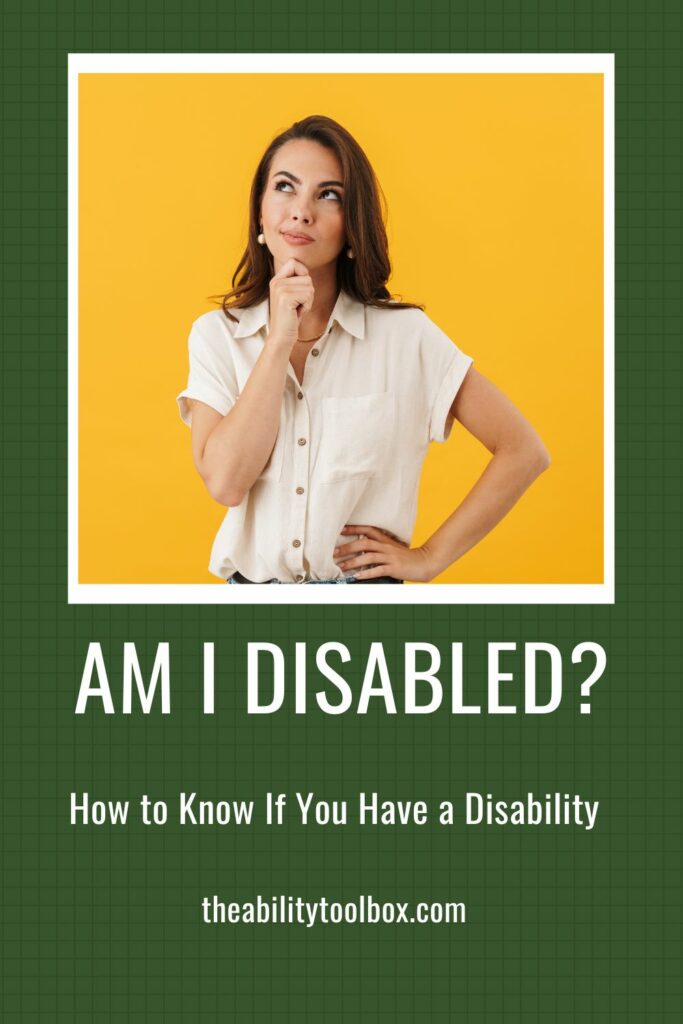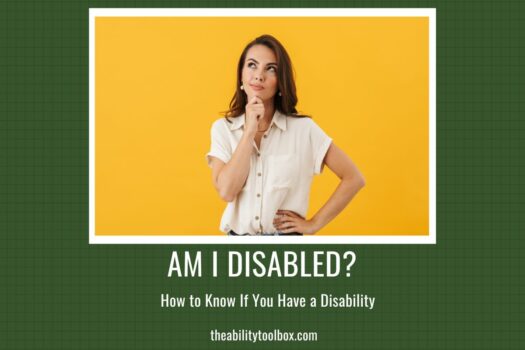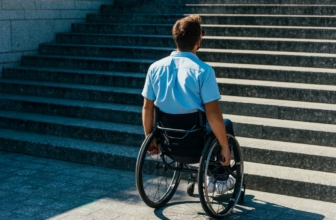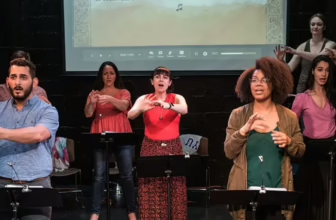If you've ever asked yourself, “Am I disabled?” this guide will help you determine if you have a disability and what it means for your life.
If you were recently diagnosed with a medical condition, or you've discovered that you're neurodivergent, you might be hearing the word “disabled” used in reference to you for the first time. This can be scary and overwhelming. Society tends to depict disability as something bad, something you don't want to have or be. That's a false stereotype; the reality is more complicated. So before you dismiss the idea and say, “Not me, I couldn't possibly be disabled,” or, “I don't identify as disabled,” let's take a look at what disability really means — and why acknowledging your disability can be empowering.
What is a disability?
When you hear the word “disability,” what's the first image that comes to mind? If you're like most people, you probably imagined someone in a wheelchair, or someone who is blind and uses a cane or guide dog. Perhaps you thought about a deaf person using sign language, or a person with Down syndrome. But disability is far more diverse, and often far less visible, than we assume based on first impressions. Disability includes people with a wide variety of medical conditions and physical and mental differences. You might even be one of them!
The definition of disability has evolved throughout history and varies by country and culture. Let's look at some key definitions of disability and think about how they may apply to you or someone you care about who is wondering, “Am I disabled?”
The United Nations Definition of Disability
The United Nations defines disabilities as “long-term physical, mental, intellectual or sensory impairments which, in interaction with various attitudinal and environmental barriers, hinder [a person's] full and effective participation in society on an equal basis with others.”
The U.N. emphasizes that “disability resides in the society, not in the person.” For example, if a person in a wheelchair can't enter a store because there are steps at the entrance, the problem is the steps, not the wheelchair user. If an employer refuses to allow a computer programmer with chronic pain to work from home, the employer is the one who has something wrong with them.
This is an essential concept for anyone who is new to disability to understand — and it can be transformative once you embrace it. Instead of blaming yourself for a medical condition that isn't your fault, look at the ways society could adapt and be accessible to everyone, including people like you.
The ADA Definition of Disability
The Americans with Disabilities Act defines a person with a disability as one who “has a physical or mental impairment that substantially limits one or more major life activities, a person who has a history or record of such an impairment, or a person who is perceived by others as having such an impairment.”
Let's unpack that definition a bit to understand what it really means.
A physical or mental impairment that substantially limits one or more major life activities — This includes everyday tasks like walking, seeing, hearing, and remembering. It ALSO includes tasks such as reading, concentrating, eating, and connecting with other people.
The word “substantially” is vague and has been subject to litigation and debate. Some medical conditions might not limit an everyday activity enough to be considered a disability. However, keep in mind that if your condition ever substantially limited a major life activity, or could be perceived as doing so, it might still count as a disability under one or both of the criteria below.
A person who has a history or record of such an impairment — This includes people who had a disability in the past, but whose condition may no longer limit any major life activities. For example, a person who survived leukemia and fully recovered after a bone marrow transplant would meet this definition of disability. It also includes people with mental illnesses such as depression or schizophrenia that have impaired their function substantially in the past, but no longer do because of medication and/or therapy.
A person who is perceived by others as having such an impairment — This includes people who have conditions that are not actually disabling, but are stigmatized or perceived as disabilities. Being HIV-positive is specifically included in this category under the ADA. Another example would be someone with a facial disfigurement.
The SSA Definition of Disability
The United States Social Security Administration manages two programs related to disability, Social Security Disability Insurance (SSDI) and Supplemental Security Income (SSI). These programs provide payments and health care to people who are unable to “engage in any substantial gainful activity (SGA) because of a medically determinable physical or mental impairment(s) that is either: expected to result in death OR has lasted or is expected to last for a continuous period of at least 12 months.” In plain language, the SSA provides benefits to people with disabilities that prevent them from working enough to support themselves.
It's important to remember that being disabled under Social Security rules only affects whether you can receive financial and health benefits through the SSA — it is not an overall definition of disability. You do NOT have to be on disability benefits in the USA or in your country to be disabled.
Am I disabled if I have a mental illness?
Yes, mental illness is considered a disability. Some mental health conditions limit one or more major life activities, such as the ability to work, socialize, or have relationships. Even if a mental illness is mild or successfully treated, the person still fits under the category of being perceived as or being recorded as having an impairment. They could still face discrimination based on having previously been hospitalized for mental health treatment or because they take medication.
Am I disabled if I'm neurodivergent?
Yes, autism, ADHD, dyspraxia, and sensory processing disorder are considered disabilities.
Am I disabled if I have a chronic illness?
Yes, most if not all chronic illnesses are considered disabilities — including those that do not have any outward or visible symptoms. Many people with chronic illnesses struggle to get the support and services they need because their disabilities are invisible. They're told “You don't look sick” and even their loved ones may not understand that symptoms such as chronic fatigue and pain can be extremely debilitating. People with chronic illness can use the spoon theory to explain their experiences to family and friends.
Am I disabled if I have a life-threatening food allergy?
Yes — food allergies limit a major life activity. We all have to eat!
One of the experiences that inspired me to write this article was talking to a friend who asked me if she would be considered disabled. She has a life-threatening food allergy to nuts.
I thought about it for a moment and then referenced the ADA definition of disability and how eating is an essential activity. I pointed out that she requires some level of accommodation to live safely in society, such as ingredient labels on foods and being able to ask restaurant servers about ingredients and getting an honest answer. She also needs to carry her EpiPen in places where a non-disabled person wouldn’t be allowed to have needles, such as in her purse on an airplane. So yes, she does indeed have a disability.
My medical condition isn't as severe as other people's. Am I disabled?
Yes, you still have a disability, even if it is mild, or you perceive it as mild.
People who are newly disabled, or who have what they think is a mild disability, often struggle with asking for and using disability services such as parking placards, bus passes, shopping cart scooters, in-home care, etc.
The Role of Disability in Your Life
As a person who has been significantly and visibly physically disabled for my entire life, I’ve often had people confide in me about their own medical conditions and neurological differences. As I age and family members get older, they often come to me asking for advice and support about navigating changes in their health and abilities. I’ve noticed that many people struggle to know whether they would be considered disabled, and understand what these conditions mean for their life.
Is being disabled a bad thing?
Being disabled is not inherently good or bad; it's simply a fact of life, and a natural part of being human. After all, everyone becomes disabled if they live long enough. Disability isn't rare, either; in the United States, one in four adults has a disability. Disability is the only minority group anyone can become part of at any time.
Society often regards being disabled as negative, and assumes that all disabilities are bad and should be fixed or cured. However, the reality is more complicated. “Disabled” covers such a wide range of conditions and experiences that there is no universal answer to this question. For example, a person who is disabled by a life-threatening disease would almost certainly want to be cured, and we can all agree that curing diseases such as cancer is a worthy scientific goal that would benefit humanity. However, many people with non-life-threatening disabilities do not regard them as negative, and see them as an essential part of their identity. For example, most people who were born deaf and grew up using sign language regard their deafness as a positive attribute, and are proud of their strong culture and community.
Many disabled people take a view that is somewhere in between. They might not like the physical and/or mental effects of their medical condition, but they are proud of the person they've become as a result of their disability and their advocacy. They may be hopeful that their disability could be cured one day, but they don't sit around waiting for a miracle — they do the best they can to live life to the fullest.
I hate being disabled. Will it ever get better?
Yes — in my experience, and in the experience of millions of disabled people who are thriving and happy, it does get better. Of course, there are no guarantees in life, but with the right medical care, support services, and technology, so much is possible. Getting the support you need to succeed can be challenging and frustrating, but it's worth it.
No matter how you feel about your disability, now or in the future, your feelings are valid. It is OK to grieve and have bad days when you feel sad about things you can't do. But I encourage you to connect with the disability community, as you may discover that you can find new ways of doing things. Being disabled doesn't mean you have to give up on all your dreams.
I don't want to call myself disabled. Do I have to?
No, you don't have to identify as disabled if you don't want to, but I encourage you to examine your feelings carefully. If you truly believe you do not have an impairment that significantly affects your life, then you're probably not disabled. But if you have an impairment and you just don't like the word disability or the idea of being disabled, you may be struggling with self-stigma and internalized ableism.
The words disabled and disability can sound intimidating and negative because that’s the message society has perpetuated about disability. But ableism, like racism, sexism, and homophobia, is based on biases and inaccurate stereotypes. “Disabled” doesn't mean you are unable to do anything and everything. It doesn't necessarily mean you can't work. It doesn't mean you can't have family and friends, pets, hobbies, goals, and anything else you want in life.
You can choose not to call yourself disabled, but it won't change the reality that you have a disability. It will only distance you from the community of other disabled people that is ready to welcome and support you. We understand that it can be hard to accept that you're disabled, but please don't hide who you are because you think you're not like those other disabled people who [insert stereotype here]. Our community is extremely diverse, and I promise there are many people like you, and many who are different from you who you can connect with and learn from as well.
How will ableism and discrimination affect my life as a disabled person?
Ableism — discrimination against people with disabilities — and sanism — bias against people with mental illness — are still common. As the U.N. definition explains, disability resides in society. Society is structured in a way that favors able-bodied and neurotypical bodies and minds, forcing people with other kinds of bodies and minds to seek “special” treatment and accommodations. Society deems people “disabled” when we cannot do certain things society deems “normal,” or when we must do them in a different way. It is especially judgmental of those whose bodies and minds prevent them from working, or working to the mind-and-body-damaging level that is often demanded under capitalism.
The social model of disability explains that prejudice and discrimination are often more disabling than any medical condition. It recognizes the impact of ableism on our lives, and the need to create an equitable society where all kinds of bodies and minds are valued.
Unfortunately, if you are disabled, you will almost certainly experience ableism. However, you can find people who will accept, understand, and support you. As you gain confidence, you can learn to ignore or address ableist comments and behavior from those around you. And you have rights under the Americans with Disabilities Act (or a similar law in your country, hopefully), so when you experience discrimination, you can fight it.
I Am Disabled. What Now?
If you have just received a diagnosis, or you have read this article and realized that you are disabled, you’re in the right place. The Ability Toolbox has lots of support and practical resources to help you construct a fulfilling life with your disability, not in spite of it. Here are some steps to take as you’re coping with this new realization and circumstances.
Breathe.
Don’t panic. Even though you may feel confused and afraid right now, there is hope. You are the same person now as you were before you became disabled or realized that you have a disability. Unless you need an urgent surgery or treatment, it’s OK to take some time to process your feelings. It’s OK to grieve. You don’t have to do anything at this moment but just be.
Learn more about your disability.
There are many places online where you can learn more about your disability. We recommend going to websites run by leading research hospitals to get information about the medical aspects of your condition and then talking to your doctor. However, those resources can’t teach you about the everyday experiences of living with your condition. That’s where sites like The Ability Toolbox come in.
Connect with other disabled people.
The disability community is vibrant and thriving and we believe in helping each other and supporting those who are new to our world. I encourage you to seek out support groups such as those here on The Ability Toolbox, on Reddit, and on Facebook. It’s good to talk to people with your condition, but don’t discount those with other disabilities who have wisdom to share.
Other disabled people can help you in so many ways. We can relate to the struggles you’re going through now and share how we found ways to cope and move forward. We can offer practical solutions to solve everyday problems. We can recommend understanding and supportive doctors in your area. We are here for you! (But remember that not every disabled person participates in the community or is in a physical or emotional space to help others, and respect boundaries.)
Get disability services and supports.
Getting support can include contacting the disability services office at your university, requesting job accommodations to work from home because of a chronic illness, or trying to get your health insurance to cover a mobility aid. Perhaps you need a disability parking permit or you're considering applying for disability benefits because you can't work.
When you connect with other disabled people, they’ll give you lots of suggestions for resources that can help with your specific circumstances. The range of possible services and supports you could need is far too extensive to cover here, but one or more of the guides we’ve created may be of assistance to you and give you ideas for accommodations that could make your life better.
Welcome to the club nobody asked to join. It’s hard right now, but things can get better. Hold on to hope and we look forward to getting to know you.

Founder and Editor-in-Chief of The Ability Toolbox. I received my BA in English from Stanford University and MA in Clinical Psychology from Antioch University Los Angeles, and have worked in entertainment and health media for over 20 years. I also blog about traveling with a disability. As a wheelchair user with cerebral palsy, I am deeply committed to amplifying the voices of the disability community through writing and advocacy.








Start the discussion at community.theabilitytoolbox.com